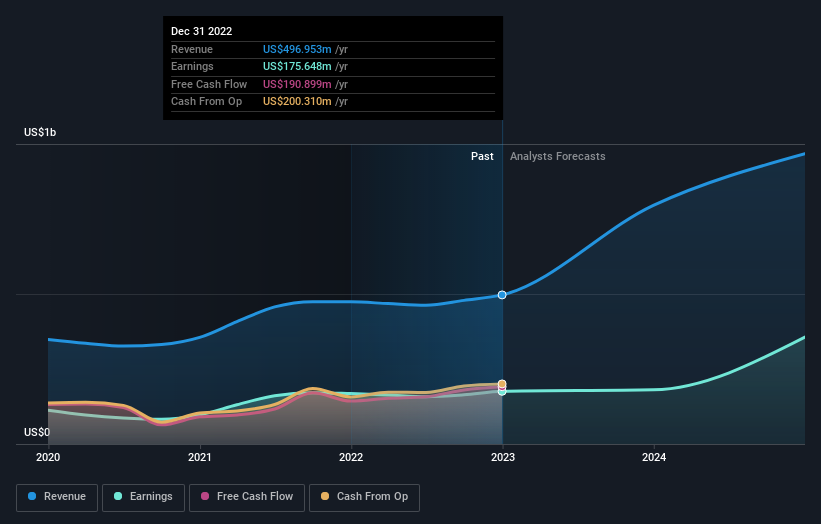- United States
- /
- Banks
- /
- NYSE:PFS
Provident Financial Services, Inc.'s (NYSE:PFS) latest 8.4% decline adds to one-year losses, institutional investors may consider drastic measures

Key Insights
- Given the large stake in the stock by institutions, Provident Financial Services' stock price might be vulnerable to their trading decisions
- The top 9 shareholders own 51% of the company
- Insiders have been selling lately
If you want to know who really controls Provident Financial Services, Inc. (NYSE:PFS), then you'll have to look at the makeup of its share registry. With 74% stake, institutions possess the maximum shares in the company. Put another way, the group faces the maximum upside potential (or downside risk).
As a result, institutional investors endured the highest losses last week after market cap fell by US$140m. Needless to say, the recent loss which further adds to the one-year loss to shareholders of 10% might not go down well especially with this category of shareholders. Institutions or "liquidity providers" control large sums of money and therefore, these types of investors usually have a lot of influence over stock price movements. Hence, if weakness in Provident Financial Services' share price continues, institutional investors may feel compelled to sell the stock, which might not be ideal for individual investors.
Let's take a closer look to see what the different types of shareholders can tell us about Provident Financial Services.
View our latest analysis for Provident Financial Services

What Does The Institutional Ownership Tell Us About Provident Financial Services?
Many institutions measure their performance against an index that approximates the local market. So they usually pay more attention to companies that are included in major indices.
We can see that Provident Financial Services does have institutional investors; and they hold a good portion of the company's stock. This can indicate that the company has a certain degree of credibility in the investment community. However, it is best to be wary of relying on the supposed validation that comes with institutional investors. They too, get it wrong sometimes. It is not uncommon to see a big share price drop if two large institutional investors try to sell out of a stock at the same time. So it is worth checking the past earnings trajectory of Provident Financial Services, (below). Of course, keep in mind that there are other factors to consider, too.

Investors should note that institutions actually own more than half the company, so they can collectively wield significant power. Provident Financial Services is not owned by hedge funds. BlackRock, Inc. is currently the company's largest shareholder with 15% of shares outstanding. The Vanguard Group, Inc. is the second largest shareholder owning 12% of common stock, and Dimensional Fund Advisors LP holds about 7.7% of the company stock. Furthermore, CEO Anthony Labozzetta is the owner of 0.6% of the company's shares.
We also observed that the top 9 shareholders account for more than half of the share register, with a few smaller shareholders to balance the interests of the larger ones to a certain extent.
While it makes sense to study institutional ownership data for a company, it also makes sense to study analyst sentiments to know which way the wind is blowing. Quite a few analysts cover the stock, so you could look into forecast growth quite easily.
Insider Ownership Of Provident Financial Services
While the precise definition of an insider can be subjective, almost everyone considers board members to be insiders. Management ultimately answers to the board. However, it is not uncommon for managers to be executive board members, especially if they are a founder or the CEO.
I generally consider insider ownership to be a good thing. However, on some occasions it makes it more difficult for other shareholders to hold the board accountable for decisions.
Shareholders would probably be interested to learn that insiders own shares in Provident Financial Services, Inc.. It is a pretty big company, so it is generally a positive to see some potentially meaningful alignment. In this case, they own around US$61m worth of shares (at current prices). Most would say this shows alignment of interests between shareholders and the board. Still, it might be worth checking if those insiders have been selling.
General Public Ownership
The general public, who are usually individual investors, hold a 22% stake in Provident Financial Services. This size of ownership, while considerable, may not be enough to change company policy if the decision is not in sync with other large shareholders.
Next Steps:
It's always worth thinking about the different groups who own shares in a company. But to understand Provident Financial Services better, we need to consider many other factors. Case in point: We've spotted 1 warning sign for Provident Financial Services you should be aware of.
But ultimately it is the future, not the past, that will determine how well the owners of this business will do. Therefore we think it advisable to take a look at this free report showing whether analysts are predicting a brighter future.
NB: Figures in this article are calculated using data from the last twelve months, which refer to the 12-month period ending on the last date of the month the financial statement is dated. This may not be consistent with full year annual report figures.
New: Manage All Your Stock Portfolios in One Place
We've created the ultimate portfolio companion for stock investors, and it's free.
• Connect an unlimited number of Portfolios and see your total in one currency
• Be alerted to new Warning Signs or Risks via email or mobile
• Track the Fair Value of your stocks
Have feedback on this article? Concerned about the content? Get in touch with us directly. Alternatively, email editorial-team (at) simplywallst.com.
This article by Simply Wall St is general in nature. We provide commentary based on historical data and analyst forecasts only using an unbiased methodology and our articles are not intended to be financial advice. It does not constitute a recommendation to buy or sell any stock, and does not take account of your objectives, or your financial situation. We aim to bring you long-term focused analysis driven by fundamental data. Note that our analysis may not factor in the latest price-sensitive company announcements or qualitative material. Simply Wall St has no position in any stocks mentioned.
About NYSE:PFS
Provident Financial Services
Operates as the bank holding company for Provident Bank that provides various banking products and services to individuals, families, and businesses in the United States.
Flawless balance sheet established dividend payer.
Similar Companies
Market Insights
Community Narratives




